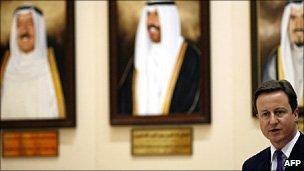Arms trade questions for David Cameron on Gulf trip
- Published

Mr Cameron visited Kuwait as part of his tour
How can you sell democracy and arms at the same time?
That is the question that has dogged David Cameron on the latest stage of his trip to the Gulf.
In his delegation of 26 businessmen, eight work for companies in the defence and aerospace industry.
Some - particularly those who read the Guardian newspaper closely - have suggested that this is somehow incompatible with his new foreign policy of promoting political and economic reform.
Mr Cameron's thesis is that it is no longer enough simply to form alliances with "highly controlling" regimes here to protect Britain's security and economic interests, and turn a blind eye to what they do to their own people. These countries are no longer stable.
Instead it is those countries that reform and give some ground to their youthful, opinionated populations that will be the most stable, he says.
But does this new found desire for democracy in the Gulf fit with the arms sales? Well, I put that question to the prime minister and his response was robust.
"Democracies have a right to defend themselves. That argument is very powerful in Kuwait.
"The idea that Kuwait should not be able to have its own armed forces, that it is unable to defend its own country and take part in defence trade, is an extraordinary argument."
He said the British rules for arms sales were among the tightest in the world. A properly regulated defence industry is perfectly right and proper.
The truth, as ever, is more prosaic. This trip to the Gulf has been planned for some time. All trips to the Gulf include business delegations that include some defence contractors.
The uprisings across the region and Mr Cameron's new foreign policy have emerged in the last few weeks. Thus do defence sales and democracy clash?
The defence issue clearly gets in the way of the trip but it does not overshadow it. That honour belongs to Libya.
- Published21 February 2011
- Published22 February 2011